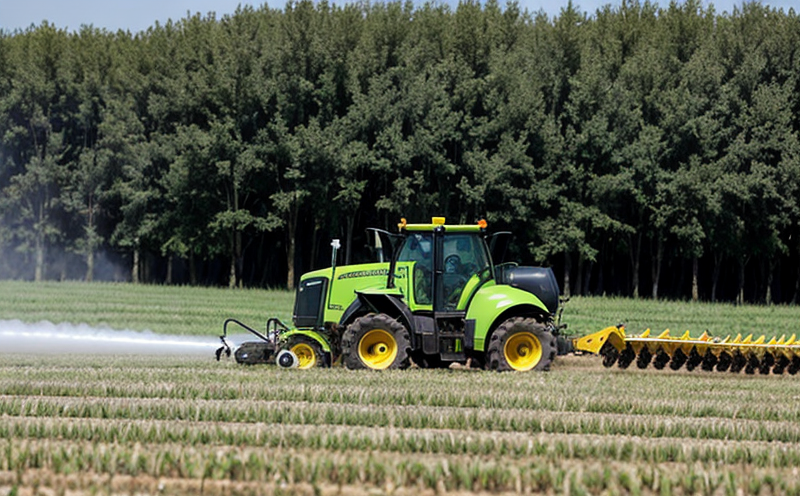Fluroxypyr Residue Testing in Crops Validation Method Development Test
The need to ensure safe and effective agricultural practices is paramount, especially when dealing with herbicides like fluroxypyr. This residue testing service focuses on validating the method used for detecting trace residues of fluroxypyr in crops post-application. Fluroxypyr, a selective herbicide used primarily against broadleaf weeds, must be meticulously monitored to prevent contamination that could affect human health and environmental safety.
Our laboratory specializes in developing robust validation methods tailored to the specific requirements of crops such as wheat, corn, soybeans, and vegetables. Our team ensures that each method is scientifically sound and meets international standards like ISO, ASTM, EN, or IEC where applicable. This service is critical for quality managers, compliance officers, R&D engineers, and procurement professionals who need to ensure their processes comply with stringent regulations.
Fluroxypyr residue testing involves several steps that are crucial in ensuring the accuracy of the results. The first step is proper sample preparation which includes cleaning the crop samples thoroughly to remove any visible contaminants or residues from other herbicides. This process ensures that the residue detected belongs exclusively to fluroxypyr.
Once prepared, the samples undergo a series of analyses using advanced instrumentation such as High-Performance Liquid Chromatography (HPLC) and Gas Chromatography-Mass Spectrometry (GC-MS). These instruments are chosen for their precision and sensitivity, allowing us to detect even trace amounts of fluroxypyr residues. The choice of method depends on the specific crop type and the expected concentration levels.
The testing process also involves setting stringent acceptance criteria. For instance, any detected residue that exceeds 0.1 ppm is considered unacceptable according to current regulatory standards in many countries. This threshold ensures that crops are safe for consumption or processing without posing risks to consumers.
In addition to the technical aspects of the test, our team provides comprehensive reports detailing every aspect of the testing process. These reports include detailed descriptions of sample preparation, the methods used, and the results obtained. They also contain recommendations based on the findings, which can be invaluable for R&D engineers looking to refine their practices or for quality managers aiming to ensure compliance.
The importance of this service cannot be overstated in today’s regulatory landscape where consumer safety is a top priority. By providing reliable residue testing services, we help our clients adhere to global standards and maintain the integrity of their products.
Scope and Methodology
| Sample Preparation | Analytical Techniques | Acceptance Criteria |
|---|---|---|
| Cleaning samples thoroughly to remove visible contaminants. | HPLC, GC-MS for residue detection. | Residue levels above 0.1 ppm are unacceptable. |
| Ensuring crop-specific protocols for optimal results. | Validation of method accuracy and precision. | Compliance with international standards. |
| Instrumentation | Data Analysis | Reporting |
|---|---|---|
| HPLC, GC-MS for precise residue detection. | Statistical analysis of data points to ensure accuracy. | Detailed reports with recommendations. |
| Use of calibration standards for method validation. | Comparison against accepted values to verify results. | Inclusion of quality control measures in the report. |
Quality and Reliability Assurance
The reliability of our testing services is underpinned by a robust quality management system that adheres to international standards. Our team undergoes continuous training to stay updated with the latest advancements in analytical techniques, ensuring that we deliver consistent and accurate results.
We maintain state-of-the-art facilities equipped with cutting-edge instruments that are regularly calibrated and validated to ensure their accuracy. This commitment to quality is further supported by stringent internal audit processes that monitor every stage of the testing procedure from sample preparation to final report generation.
Our clients can be assured of transparency in our operations, as we provide detailed documentation for each test conducted. This includes records of all method validations, calibration certificates, and any modifications made during the testing process. In addition, we offer a comprehensive quality assurance program that ensures compliance with all relevant regulations and standards.
By adhering to these stringent protocols, our clients can trust in the accuracy and reliability of our residue testing services. This commitment to excellence is crucial for maintaining high-quality agricultural products and ensuring consumer safety.
Competitive Advantage and Market Impact
The demand for safe and effective agricultural practices continues to grow, driven by increasing global population and the need for sustainable farming methods. Our expertise in fluroxypyr residue testing provides a significant competitive advantage by ensuring that our clients meet or exceed regulatory standards.
By offering validated methods tailored to specific crops, we help our clients stay ahead of market trends and regulatory changes. This ensures that they can confidently continue using fluroxypyr while maintaining the safety and quality of their products. Our services are particularly valuable for R&D engineers looking to refine their practices or for compliance officers needing to ensure adherence to stringent regulations.
The global market for agricultural testing is expanding, with increasing emphasis on sustainability and food safety. By providing reliable residue testing services, we help our clients maintain a competitive edge in this evolving landscape. Our commitment to quality and reliability ensures that they can trust us to deliver accurate results every time.
This service not only enhances the reputation of our clients but also contributes positively to public perception by ensuring safe agricultural products. In an era where consumer safety is paramount, our expertise plays a crucial role in maintaining trust and confidence in agricultural practices.





